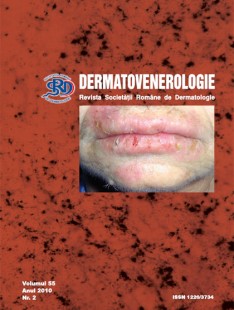Clinical cases
Polymorphic eruption of pregnancy
Definition:
Polymorphic eruption in pregnancy is a relatively frequent dermatosis, with an incident of 1:160-1:240 in pregnancies; it is of unknown etiopathogeny, benign, self-limited and without recurrence on next pregnancies.
Aim:
Due to the high incidence, important symptomatology and limited therapeutical options, we consider of interest the following case of polymorphic eruption in pregnancy.
Case presentation:
We present the case of B.M., a 29-year-old prima gravida, at 32 weeks of pregnancy, hospitalized in the Dermatological Clinic in January 2009, for an erythematous-papular eruption with unfrequent cockades, first localised on abdominal flanks, followed by lesions in the thighs, shanks, arms with symmetrical distribution, in evolution for one week. The patient also had striae gravidarum after a significant weight gain (35 kg), especially in the third term.
Paraclinical findings were normal, histopathological examination showed spongiosis and inflammatory infiltrate in upper and middle dermis with lymphocytes, hystiocytes and eosinophils.
The diagnosis was based on clinical aspects, paraclinical findings and confirmed by histopathological examination.
Treatment consists in low doses of systemic corticosteroids, symptomatic drugs and emollients.
The appearance of a dermatosis in pregnancy requires careful supervision and precaution in drug administration due to teratogenic risk of some classes of medications, especially in the case of this patient, who has a history of therapeutic miscarriage after using medication with proved teratogenic effects.
Conclusions:
The cutaneous modifications in pregnancy are multiple and complex. Polymorphic eruption in pregnancy is often difficult to diagnose due to deceitful aspects of lesions and frequently leads to wrong diagnosis.
Polymorphic eruption in pregnancy is the result of the impact between allergic and pregnancy field, the possible triggering agent being endogenous progesterone.


